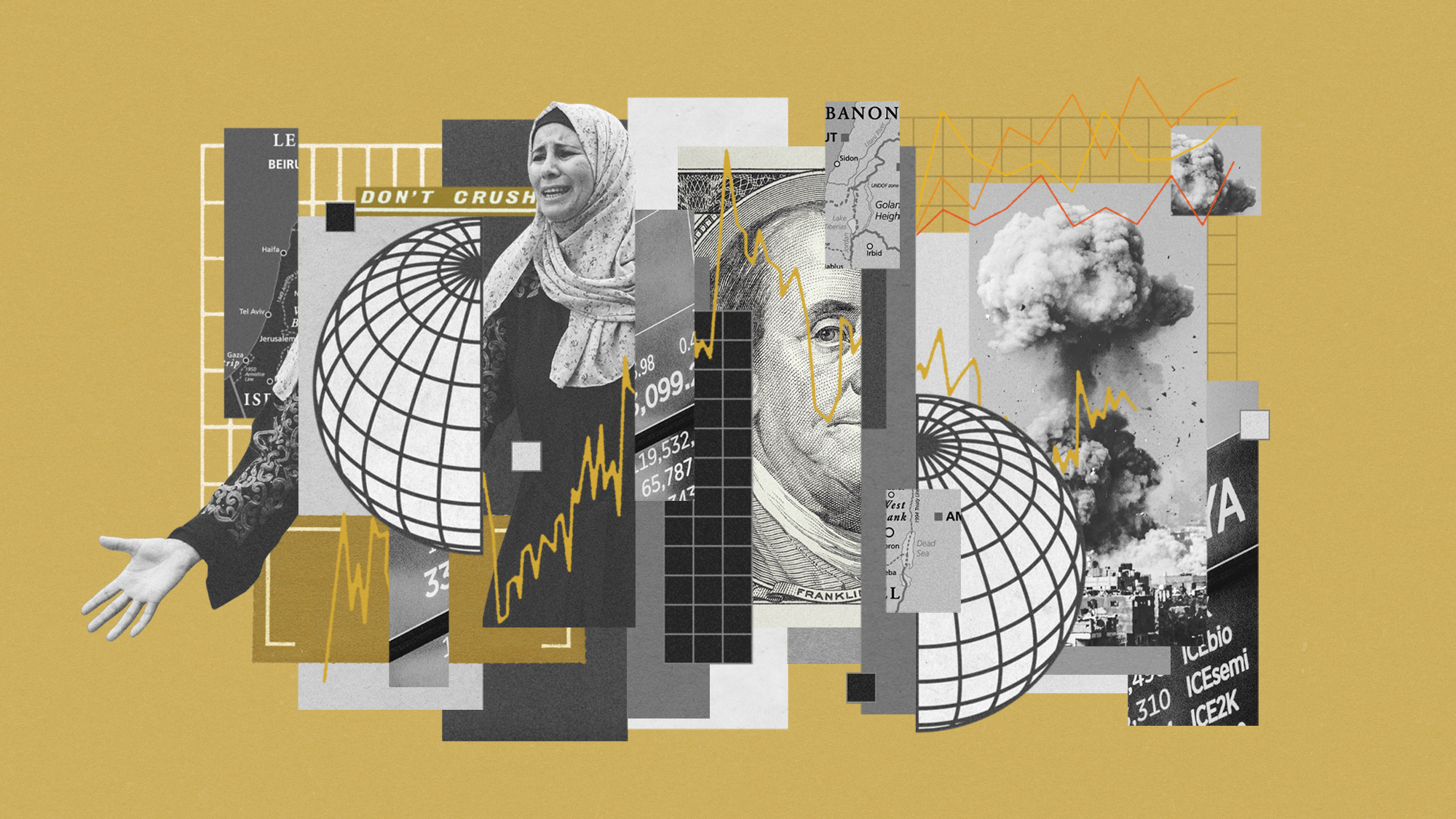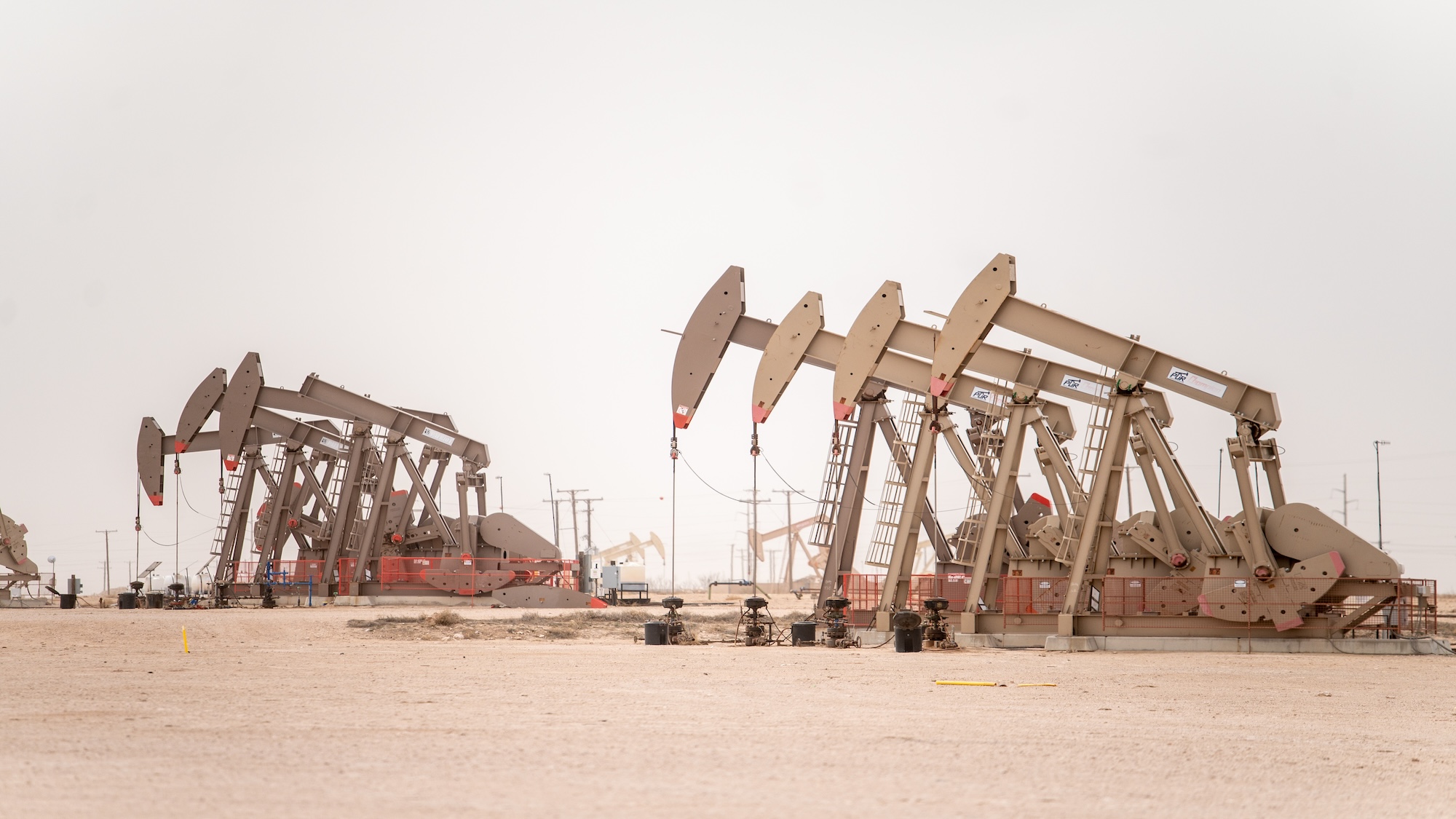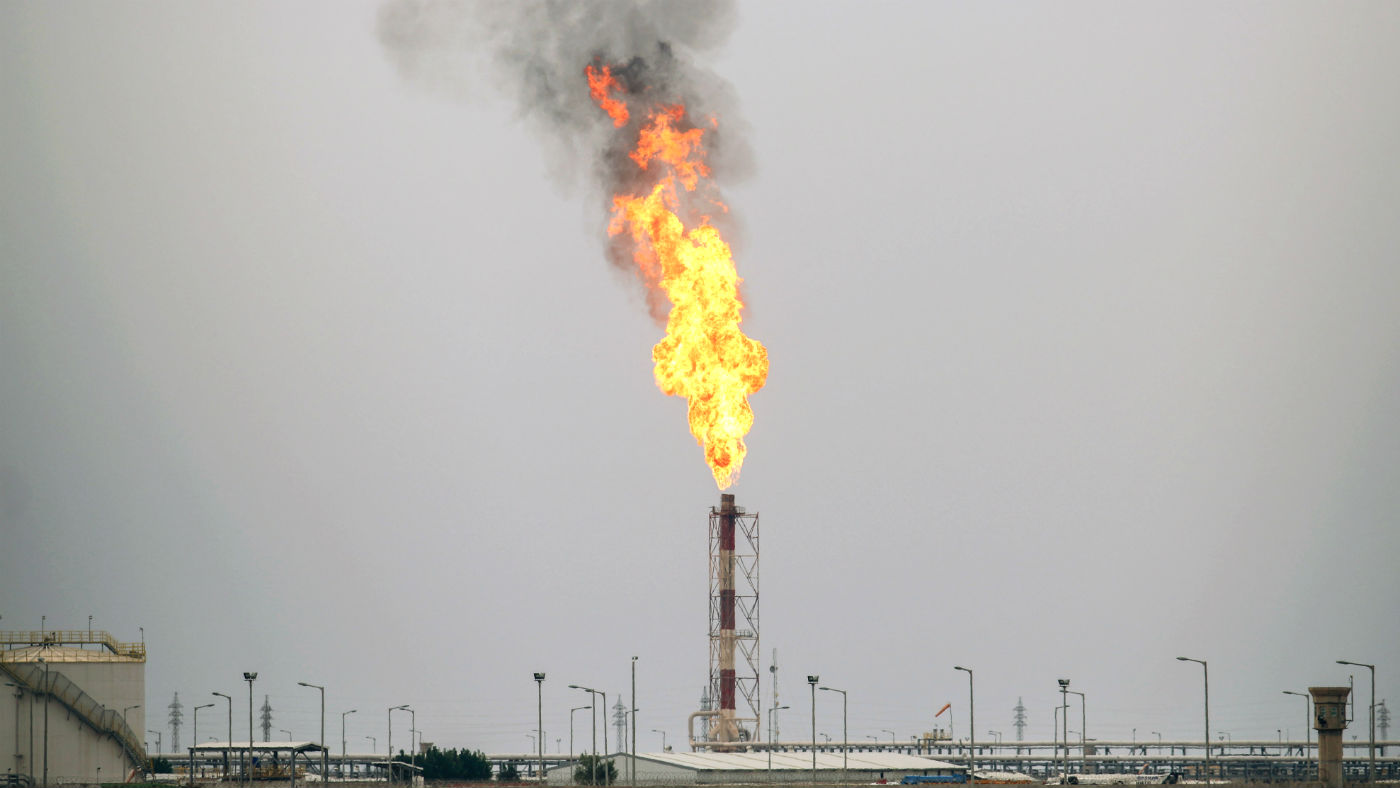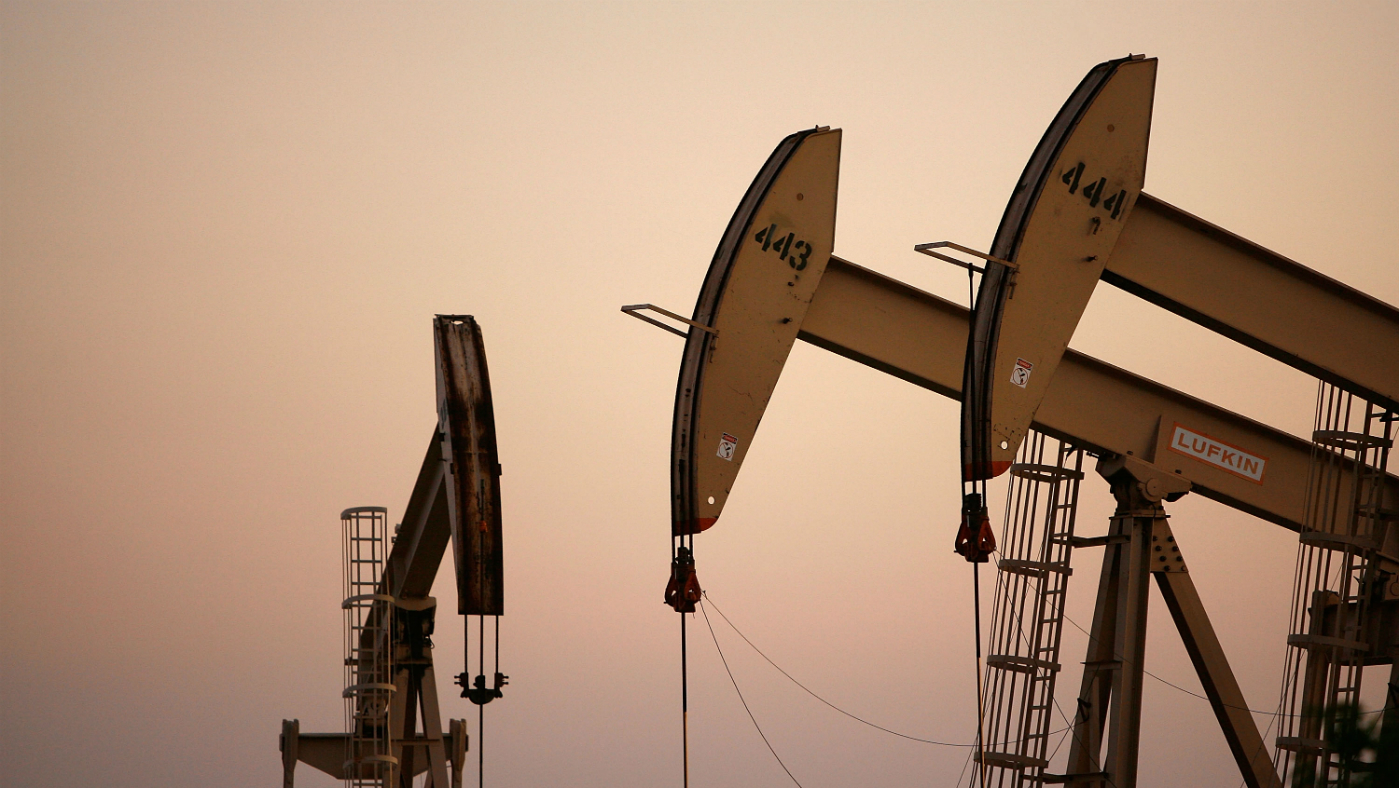Oil price posts two-year highs - but how long can it last?
Brent rose above $59 a barrel this week, its best third-quarter showing since 2004

A free daily email with the biggest news stories of the day – and the best features from TheWeek.com
You are now subscribed
Your newsletter sign-up was successful
Oil price: UK sector braced for 'wave of failures'
27 November
The oil price crash has devastated the finances of companies operating in the North Sea and dramatically reduced their contribution to the UK economy.
According to figures in the Autumn Statement, released by the Office for Budget Responsibility, the tax take from the UK oil sector – on which an independent Scotland's budget was at one time projected to be balanced – was £2.2bn last year but will slump to £130m this year.
The Week
Escape your echo chamber. Get the facts behind the news, plus analysis from multiple perspectives.

Sign up for The Week's Free Newsletters
From our morning news briefing to a weekly Good News Newsletter, get the best of The Week delivered directly to your inbox.
From our morning news briefing to a weekly Good News Newsletter, get the best of The Week delivered directly to your inbox.
The Daily Telegraph points out that the oil sector provided tax revenues of £11bn as recently as four years ago.
International benchmark Brent crude, which relates to prices paid for oil produced in the North Sea, was around $115 a barrel in the summer of 2014 but has now fallen to a figure that's stubbornly below $50 a barrel. This is the level at which production on average is deemed to break even.
Yesterday the oil price drifted down again and it is now hovering around $45 a barrel, after the US reported another increase in its stockpile of one million barrels to its highest levels in eight decades.
As further evidence of unrelenting oversupply in the market, this might have prompted a more severe slide were it not for the fact that traders are optimistic about a meeting of the 13-nation Opec cartel next week amid hints that it may reverse its high production policy. MarketWatch says, however, that "the market holds conflicting views on what the bloc will do".
A free daily email with the biggest news stories of the day – and the best features from TheWeek.com
The advisory firm FRP, which restructures failing businesses, told the Telegraph that enquiries from struggling businesses dependent on the oil sector had "gone through the roof" as a result of the persistently low oil prices.
"The number of internal reviews by banks into the health of oil and gas-reliant businesses that they have funded are understood to have tripled recently."
Despite calls from UK Oil and Gas, the UK trade body for oil companies, for further tax breaks in order to relieve the pressure on producers, FRP says this will have little effect on the troubled industry.
"No amount of efforts from the Treasury can stimulate capital expenditure by the oil majors" in the face of oil trading at below $50 a barrel, said Tom MacLennan, a partner at the firm.
FRP says that company failures and job losses will be chiefly in Aberdeen, the UK mainland hub for the offshore oil industry.
Oil prices fall as expert predicts 'super contango'
26 November
Oil prices have struggled amid ongoing anxiety over an excess of supply. In New York, light, sweet crude oil futures due for delivery in January surrendered small gains in Asia to move 24 cents lower, or 0.5 per cent, to $42.80 a barrel in the Globex electronic session. On London's ICE Futures exchange, January Brent crude dipped 49 cents, or 1 per cent, to $45.68 a barrel.
US production of crude slid by 17,000 barrels a day to 9.165m barrels, compared with the previous week. However, the four-week average daily production of 9.173m barrels was still 144,000 barrels higher than the same period last year.
"This clearly has not been enough to rebalance the US market, let alone the global one," noted Timothy Evans, a Citi Futures energy analyst.
Meanwhile, CNBC says that oil prices have now moved into 'super contango'. John Kilduff writes: "The vast crude oil glut or mega-glut is manifest in the West Texas Intermediate and Brent crude oil price curves, which have moved into a 'super-contango.'"
A contango occurs when the front-month or near-term futures contract is trading at a discount compared to longer-dated futures contracts.
A solitary cause for celebration in the oil industry is the strong demand for gasoline. Last month, US demand was at its highest in eight years, though the appetite for oil may well drop off after the holiday season.
Oil price crash 'delayed', not halted, by Middle East tensions
25 November
The oil price rose yesterday at its fastest rate for three weeks, hitting a two-week high as renewed tensions in the Middle East led to speculation that supplies might be affected.
International benchmark Brent crude rose by three per cent to more than $46 a barrel – the first time it has been above $45 since last week and the first settlement above the threshold since the second week of this month. US benchmark West Texas Intermediate rose by 2.7 per cent to a little less than $43 a barrel.
The rally follows Turkey's downing of a Russian jet near the Syrian border, which was branded a "crime" by Russian president Vladimir Putin and has sparked a major diplomatic crisis. A rush to safe havens by investors has boosted commodities generally, with oil registering some of the best gains as traders bet on the fact that any adverse effects on production could help to ease the global supply glut.
[[{"type":"media","view_mode":"content_original","fid":"87345","attributes":{"class":"media-image"}}]]
The sharp bounce has proved to be short-lived, however. The oil price softened overnight and Brent was down by one per cent in London this morning, closing in at around $45.50 a barrel.
One reason that the gains are so pared down is the recent release of data from the American Petroleum Institute, which points to another build-up of 2.6 million barrels in US stockpiles, the Wall Street Journal reports. This has stoked ongoing concerns over global oversupply, which is so deep-seated that even with a big hit to production the oil market will take some time to rebalance.
Another factor is that Syria is a relatively small oil producer, so the crisis is likely to remain relatively contained. Of greater significance is a meeting of the Saudi-led Opec cartel on 4 December, which based on this week's rumours could see a shift in strategy away from its painful production turf war.
Even this is likely to delay, rather than halt, an anticipated sharp fall in prices, however, as analysts warn that the market needs a more severe 'correction' to fully rectify the supply imbalance.
"Ultimately, we still see a drop… but such a development is not expected until the market gets through the Opec meeting at the end of next week and when increasingly bearish global supply balances place additional pressure," Jim Ritterbusch of Chicago-based oil consultancy Ritterbusch & Associates, told Reuters.
Oil price on 'wild ride' after Saudi pledge
24 November
The oil price rose slightly on Monday and overnight in Asia after a pledge from Saudi Arabia hinted at an end to a painful production turf war that has been raging for more than a year.
The comments will bring hope to major oil producers and countries reliant on oil revenues seeking to rebalance the current global oil glut. Opec has kept output at historically high levels to drive out competition from US shale producers and other competitors, but the policy has only been modestly successful, with the resulting price slump taking some of the poorer Opec members to the brink of bankruptcy.
The oil price rose sharply at first yesterday, but then gave back most of its gains in what Reuters branded a "wild ride". International benchmark Brent crude settled up at around $1.50 a barrel and was trading a little above $45 a barrel this morning – a very low level that's unprofitable for most producers. US benchmark West Texas Intermediate was just above $42 a barrel.
The mixed response can be partly attributed to the fact that this is not the first time there have been similar murmurings so many industry experts remain doubtful that Saudi Arabia will genuinely change its strategy. "If the market really believes the Saudis are ready to support prices, prices would be rebounding a lot higher," says Daniel Ang, an energy analyst at Phillip Futures.
The other reason for the lack of optimism is that the global glut is so deep-rooted that most experts believe a turnaround is a distant dream even if Saudi Arabia, and by definition the power Opec cartel, were to change tack. With tankers full of unsold oil now queueing up at ports, it will take a long time to reverse the oversupply. Meanwhile, Iran is about to rejoin the international economic fold with a big backlog of oil to shift.
This is why some experts reckon that oil will need to drop to a brutal 'cost price' early next year to clear out expensive excess production. Prices of as low as $20 a barrel are currently being discussed.
Oil price: 'battle line' drawn as early 2016 plunge predicted
23 November
The oil price fell back sharply overnight in Asia, as a surge in the US dollar prompted a wider commodities rout.
The greenback hit a seven-month high against a basket of global currencies, Reuters reports, as speculation that the US Federal Reserve is about to hike interest rates intensifies. Commodities are typically traded in dollars, so a rise has the effect of making them more expensive for foreign buyers.
Metals were hit particularly hard, with copper falling to a six-year low and gold slipping back into decline after a brief rally at the end of last week. Oil, which is also suffering from concerns on demand amid a growth slowdown in China and over an ongoing supply glut, fell sharply.
International benchmark West Texas Intermediate dropped by nearly two per cent and was trading some way below $44 a barrel this morning. US benchmark West Texas Intermediate fell more than three per cent and was around 60 cents above $40 a barrel.
This means WTI is close to the "battle line" that, if breached, could precipitate a more severe fall.
Ric Navy at brokerage RJ O'Brien & Associates LLC told the Wall Street Journal that $40 was a key psychological support level that was once the top of the market. If a close were to happen below this level then widespread predictions of $30 or even $20 a barrel would come into view, he said.
Daniel Ang at Phillip Futures reckons prices will hold this week. This is not least because the dollar is likely to fall back from its current high, as a slew of economic data represents "more downside than up" following the recent strong rally.
Kang Yoo-jin, commodities analyst at NH Investment and Securities in Seoul, predicted support for oil at current low prices from rising seasonal demand and waning US output, which should combine to prevent another sharp slide before the end of the year.
Attention is then focused on whether there may be a sharp selloff in early 2016. Analysts have already said that oil could hit a new low of anywhere between $35 and a 'cost price' of $20 by around March (see below), as a surge in exports from Iran and potentially weaker demand after a mild winter reignites concern over supply.
-
 One great cookbook: Joshua McFadden’s ‘Six Seasons of Pasta’
One great cookbook: Joshua McFadden’s ‘Six Seasons of Pasta’the week recommends The pasta you know and love. But ever so much better.
-
 Scientists are worried about amoebas
Scientists are worried about amoebasUnder the radar Small and very mighty
-
 Buddhist monks’ US walk for peace
Buddhist monks’ US walk for peaceUnder the Radar Crowds have turned out on the roads from California to Washington and ‘millions are finding hope in their journey’
-
 How might the Israel-Hamas war affect the global economy?
How might the Israel-Hamas war affect the global economy?Today's Big Question Regional escalation could send oil prices and inflation sky-high, sparking a worldwide recession
-
 Recent mega-mergers could signal a turning point for the US oil industry
Recent mega-mergers could signal a turning point for the US oil industryTalking Point Both Chevron and Exxon have recently spent billions to acquire smaller oil companies
-
 Has Saudi Arabia lost control of oil prices?
Has Saudi Arabia lost control of oil prices?Today's Big Question Kingdom goes it alone to cut production, risking tension with US and reigniting cooling inflation in Europe
-
 US angered by Opec+ oil cut
US angered by Opec+ oil cutSpeed Read Energy prices to rise further as producers slash supply by two million barrels a day
-
 Global oil demand forecast lowered for 2020 and 2021
Global oil demand forecast lowered for 2020 and 2021Speed Read IEA report says jet fuel demand remains the major source of weakness
-
 Are US-Iran tensions flaring again?
Are US-Iran tensions flaring again?In Depth Trump threatens military action over Twitter
-
 Can a deal be struck to raise oil prices?
Can a deal be struck to raise oil prices?In Depth Opec+ will convene today over video link in a bid to boost crude
-
 What do negative oil prices mean?
What do negative oil prices mean?In Depth Perfect storm of oversupply and storage shortages sees producers paying to get rid of US crude